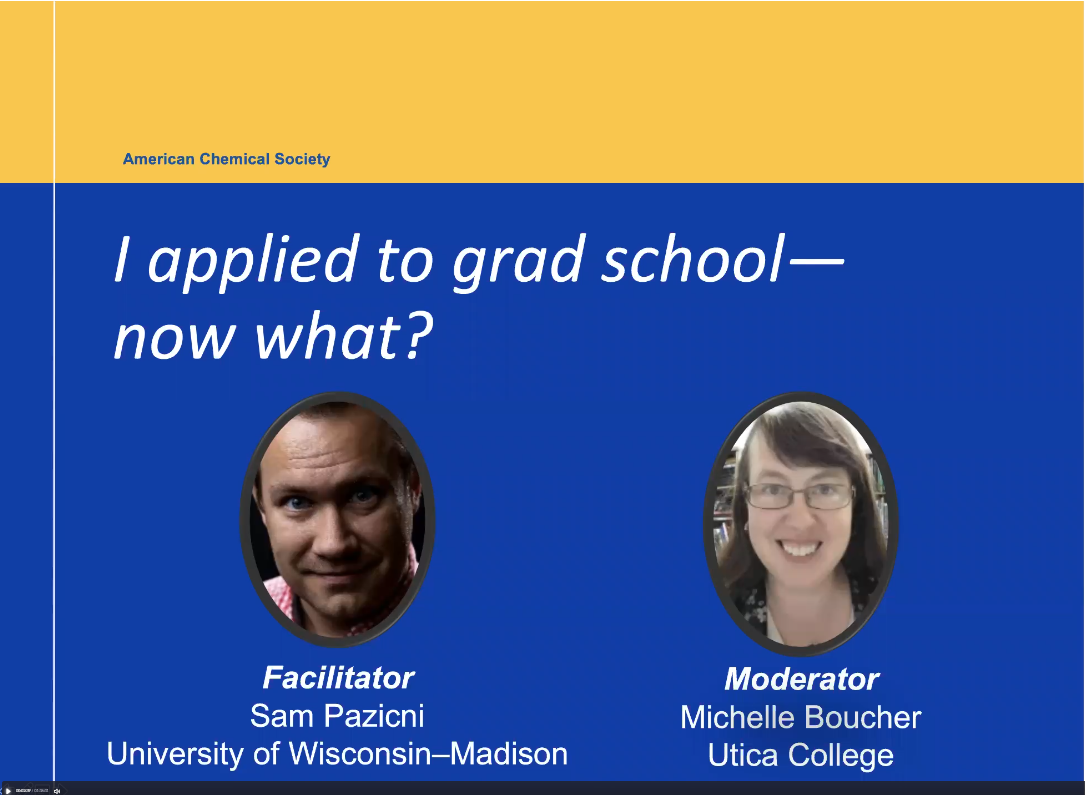After the Application: Your Next Steps on the Path to Grad School
If you have applied to graduate school, you know that submitting the application is just the start of the journey. First you need to get in. Or (eek!), deal with not getting in. Then you need to sift through the offers, visit schools, make a final decision (that will determine your life for the next 3-7 years), and successfully transition from being an undergrad student to a grad student.
It can be overwhelming. On February 8, ACS convened the “I Applied to Grad School—Now What?” workshop. Facilitated by Sam Pazicni, assistant professor of chemistry at the University of Wisconsin, Madison, moderated by Michelle Boucher, associate professor of chemistry at Utica College, and assisted by a panel of faculty and graduate students, the workshop provided insight and advice for this stage the graduate program application process.
Here are four takeaway messages:
1. Consider your offer letter pragmatically
Most doctoral programs will provide support for tuition, fees, and cost of living. But just comparing the total amount of money offered won’t tell you enough to make a decision.
You should also consider:
- Whether tuition and fees are covered by the stipend or simply waived
- Amount of stipend vs. the local cost of living
- What benefits (medical, dental, emergency, etc.) are included
- How long support is guaranteed for
- Whether the program will support you academically, professionally, and mentally
2. Ask questions
Traditionally, students who receive an offer from a graduate program visit the institution for a few days. As the pandemic continues, most schools have moved their program visits online. Though it can be harder to get a feel for a program virtually, visits are still a key time to ask important questions.
Visits—virtual or otherwise—give you a chance to meet with faculty whose work you are interested in, determine if their personalities are compatible with your working style, and learn more about how the program functions and what resources are available.
You will also want to meet as many grad students as possible to get the inside scoop on what the program and faculty are really like. Be sure to ask about both pros and cons, as well as details; after all, a research advisor that likes to hear from the team frequently might feel supportive to some students but micromanaging to others, depending on how they prefer to work.
The most important thing to ask yourself is, “Do I feel comfortable here?” Will you feel respected for who you are? Will you have the mentors and colleagues you need to thrive? Do you like the area? (You won’t spend all of your time in lab, after all.)
3. Prepare to become a next-level student
Graduate school is a unique experience. Your undergraduate experience was shaped largely by coursework and success (e.g., good grades, successful projects). In most graduate programs, you will have much less coursework that you did in undergrad, have some teaching responsibilities, and be engaged in a lot of research. Because research is more error than trial, you are likely to face a lot of failure. How you handle failed experiments, rejected papers, and challenging projects will define what you learn and how you grow as a professional.
Self-care will also become increasingly important. Graduate school is stressful for most students, so finding the resources, strategies, and support that work for you is crucial. And while research advisors are there to help, they are no substitute for actual therapists. You will need to decide when the stress is too much, how to manage it productively, and when to seek professional emotional or mental support.
4. Didn’t get an offer? Don’t panic!
Not all students who apply to a graduate program get in. If you are one of them, remember that programs have a limited number of slots to fill with a lot of factors at play. Chances are good that funding had more to do with the rejection letter than your qualifications.
If you don’t get into a doctoral program, consider pursuing a master’s degree. Though it takes more work to find a paid program, they do exist and can bolster your future Ph.D. application.
You also can take a year or two to gain valuable experience by working for a company or scientific organization. Admissions committees often find older applicants more focused and driven, which will improve your chances when you reapply.
Finally, look for opportunities like the ACS Bridge program that are designed to help applicants better prepare for graduate school.
Most importantly, don’t give up. If you believe graduate school is where you belong, you can get there!





